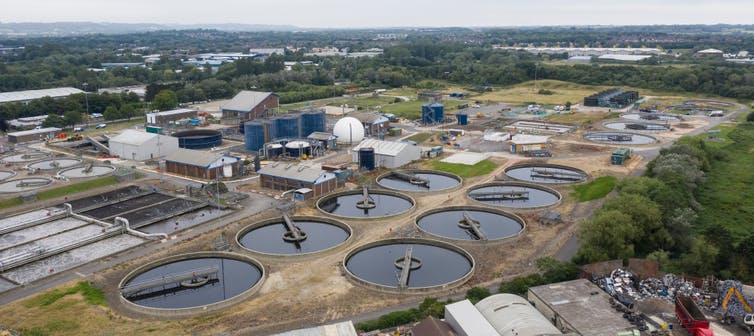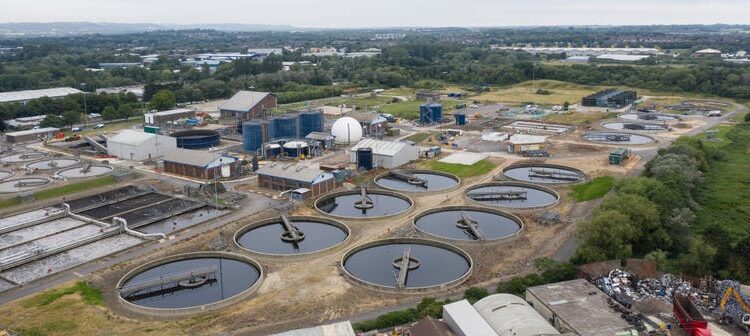It may not feel like it when you’re swabbing your throat, but improving how we test for diseases is one of the big positives of COVID. Applying methods developed for COVID to other diseases could revolutionise how we detect the causes of disease over the next decade.
When thinking of COVID testing, lateral flow and PCR tests spring to mind. However, there’s one other, lesser-known advance that’s remained quite literally underground – testing human sewage to monitor the spread and prevalence of COVID across the UK.
When we become infected with COVID, we all shed the virus in respiratory droplets. However, at least half of people are expected to shed the virus in their faeces too. Although not infectious, the coronavirus’s genetic material can be detected in sewage, allowing many countries to supplement their testing programmes with wastewater monitoring.
This was established early on in the pandemic. As soon as COVID had taken hold in spring 2020, a team at Bangor University started testing wastewater at key cities in the UK, including Cardiff, Manchester and Liverpool. By adapting methods used previously to track norovirus in wastewater, the team soon confirmed that levels of the coronavirus in wastewater map closely to local cases.
British scientists specialising in wastewater analysis then came together to refine the methods for detecting the virus. Their work also permitted the viral genetic material found in wastewater to be genomically sequenced, meaning different viral variants could be spotted.
Soon afterwards, a national wastewater monitoring programme was set up. In England, it works by gathering samples of untreated sewage four times a week from roughly 270 sewage treatment works across the country, assessing collectively the sewage of around 40 million people.

urbanbuzz/Shutterstock
The programme can show where the prevalence of the virus is increasing and decreasing, and through sequencing, can also detect the emergence and spread of variants. Importantly, wastewater testing is cheap, non-intrusive, captures everyone connected to a sewage treatment plant (so doesn’t require people to choose to participate) and can be used in most urban settings.
With the emergence of the less symptomatic omicron variant, and as COVID testing is downscaled in the future, conventional testing methods will be much less able to keep track of the virus. So governments are now evaluating whether wastewater can lead the way in COVID surveillance.
In parallel, researchers are also trying to reveal what other secrets wastewater may hold, and how these can be used to improve people’s health and wellbeing and guide future healthcare policy.
Not letting waste go to waste
Given the evidence linking human gut bacteria to a range of common diseases, together with the success of using wastewater monitoring to track COVID, there’s now interest in using urban wastewater more broadly as an indicator of community health.
For example, many other respiratory viruses are also shed in faeces, including influenza viruses and respiratory syncytial virus. The sampling approach and analysis methods to test for these are almost identical to those already used for monitoring COVID.
Unsurprisingly, wastewater monitoring can also be used to assess the levels of gastrointestinal viruses that are circulating. Noroviruses, enteroviruses and others that are spread by the faecal-oral route are present at super-high levels in diarrhoea, making them easy to track.
The possibilities also extend beyond viruses and faecal material. In some ways, the urine component of sewage contains more valuable information about our health. We are all familiar with using urine tests to see if athletes have taken banned substances or to screen for common health conditions such as diabetes. To date, however, we haven’t applied the same principles to wastewater to look at community health and how this changes over time or between regions.
For example, it’s notoriously difficult to measure the mental wellbeing of a population and how this is affected by changes in government policy, season or world events. But by measuring certain chemicals in wastewater – such as cortisol, the body’s primary stress hormone – we may be able to develop a way of routinely assessing the country’s collective feelings.
Coming to a town near you
The measurement of chemicals and genetic material in human waste does, however, raise some potential ethical concerns. At present, no attempts are made to trace observations back to individual households as this undermines the unbiased and anonymous foundations that underpin wastewater-based community surveillance. But in future, we’ll need to set out clear guidelines on the accessibility, governance and use of wastewater data.
Alongside taking measurements at large wastewater treatment plants, there’s also potential to look at “near-source” locations – sites where there’s a high risk of infection due to high-density housing (for example, university halls of residence or prisons) or where an infection spreading is of particular concern (such as hospitals and care homes). There’s growing evidence, through ongoing research, that wastewater sampling at these locations can detect disease outbreaks when routine testing has failed, allowing preventative measures to be implemented quicker.

Image Supply/Shutterstock
Another potential application gaining traction is monitoring wastewater at international borders. It’s likely that new coronavirus variants enter the UK every day via foreign travel. Most of these variants aren’t as infectious as omicron and don’t catch on, and the frequency with which these import events occur remains unknown. But initial evidence from ongoing research indicates that targeted sampling of wastewater from boats and aircraft may allow the arrival of new coronavirus variants to be reliably estimated.
So flush and forget is no longer an option. Wastewater tells no lies about societal behaviour, and analysing it should reap rich rewards. We need to harness the rich wealth of information in our sewage and use it for public good.
![]()
Andrew Singer has received funding from the Natural Environment Research Council, the Department of Health and Social Care and the Home Office Accelerated Capability Environment. He is a non-executive director at Bio Data Networks.
Davey Jones receives funding from the Welsh government, UK Health Security Agency, the Department of Health and Social Care, the Department for Environment, Food and Rural Affairs and the Natural Environment Research Council.
























